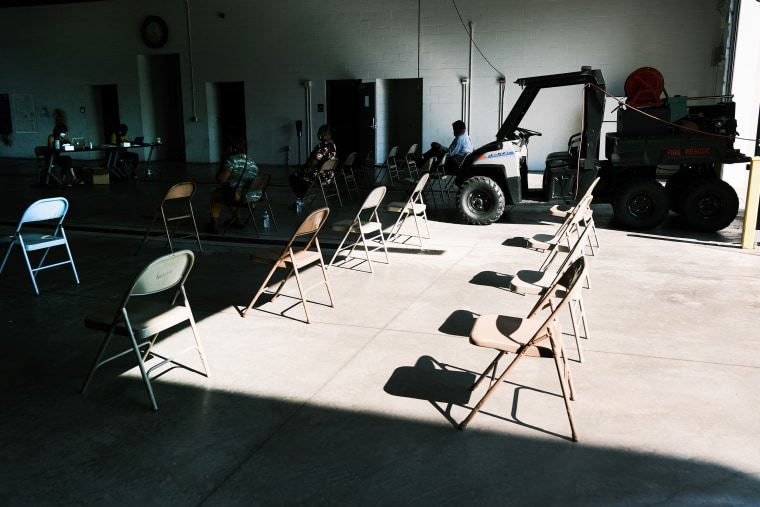Last year, during lockdown, I read “The Great Influenza” by John M. Barry. My father’s mother died in the 1918 epidemic, leaving my father a three-year-old half-orphan and changing his life forever.
Experts recommend using soft skills of listening and empathizing to persuade holdouts to get vaccinated. But instead our hearts are hardening.
I found the book oddly comforting. Pandemics, it taught me, have beginnings, middles and ends. The 1918 event took millions of lives and went after the young and strong. But even without vaccines or modern medicine, it ultimately went away.
That surely would happen to us, I told myself. And when we actually got safe and effective vaccines, I became even more optimistic. It seemed as if the world would soon get back to normal.
Not the same normalcy, of course. More like the post-9/11 reality, where we remained vigilant while the wheels of commerce and daily life gradually restarted. But Covid-19 isn’t behaving this way, and no expert can predict what will happen. Instead of the sense that we’re on the right track, there’s a feeling of powerlessness, frustration and anger.
And we have no one to blame but ourselves. Rich nations didn’t do enough to share vaccines with poor ones. So many millions of vulnerable people were invitations to the virus to mutate, and it did. We thought the Covid of last winter was bad; now we’re confronting a new version that is twice as contagious.
Even then, if more of us in the U.S. had gotten the vaccine, worn masks and been careful, the delta variant might not have become so dominant here, wreaking havoc on a summer that was supposed to signal the slow return of happier days.
Remember those few months in the first half of the year when getting the shots made you feel safe? When that little card was a license to hope, permission to plan? Colleges would reopen in the fall. People would slowly return to the office.
The euphoria that peaked on July 4 is almost entirely gone. Once again, we’re seeing surging cases and overtaxed hospitals. Even a former president had to change his 60th birthday plans. Businesses ranging from The New York Times to Google to Lyft are all delaying reopening their offices.
Remember those few weeks in late spring when Covid stopped making the front page? When it seemed as if a trip in early September was something to consider, even purchase tickets for? My husband and I, giddy with the prospect, did just that in late April.
The month before a big trip used to be part of the fun, figuring out which tours we wanted to take and which restaurants we wanted to try. Now the only thing we’ve scheduled is our appointment for a Covid test 72 hours before we’re set to leave. With all the talk of breakthrough infections among the vaccinated, who knows if we’ll test negative and be allowed to travel?
In the spring, we felt sorry for the vaccine hesitant, who were unable to realize the gift science had handed us and let their irrational fear of side effects or their disdain for Democrats deprive them of safety.
We felt so snug and secure in our vaccinated armor, assuming that their decisions, while regrettable, would have little bearing on our future. Now we know that we can’t escape the pandemic unless they change.
And there’s little reason to think they will. Vaccine doubters claim they’re waiting for the shots to be proven safe and effective. We are in a five-alarm fire, and they’re wondering whether the fire extinguishers work.
When the fire isn’t raging, it’s not like Americans are known for being careful about what goes into our bodies. We pop ibuprofen like M&Ms, ignoring the fact that too much can cause harm. We think nothing of mixing acetaminophen with alcohol, although that practice can be dangerous for regular drinkers.
The Food and Drug Administration is suggesting it may soon formally approve the vaccines we’ve received under emergency authorization. But I suspect that still won’t make believers out of vaccine skeptics, even those who point to the lack of formal approval as a reason to hold off.
Too many have invested too much of their identities in vaccine resistance, either because they believe they are stronger than the virus, or claim they know more than the world’s leading scientists, or worry about serious side effects even though they have proven to be very rare. You hear interviews with nurses working in hospitals who question whether the vaccines actually work, insisting on the right to their truth, and you want to weep in frustration.
Experts recommend using soft skills of listening and empathizing to persuade holdouts to get vaccinated. But instead our hearts are hardening. Every day, more of us are supporting mandates and penalties. No more lotteries and gift cards. No more free beer.
Questions that used to seem churlish now seem reasonable. Isn’t declining vaccination dangerous behavior that should make health insurance more costly? Should a refusal to vaccinate get you fired? Should vaccine resisters even qualify for life insurance?
I am masking more, resuming my frequent consultation of online medical journals, turning down any invitations for indoor events even among the inoculated. I can feel myself climbing back into my pandemic cave.
Covid still peoples our dreams and thoughts. I see a recurring image of St. George and the Dragon. I’m not sure if I’m envisioning the version by Raphael or Uccello. It doesn’t matter. In both paintings, we know the comforting ending: The damsel will be saved and the dragon will be slain.
Will this virus meet its end? Not necessarily as dead as the dragon, but weakened enough to let us breathe? Vaccine resisters may be blindingly sure about their future. Ironically, it is the vaccinated who bear the burden of doubt.



